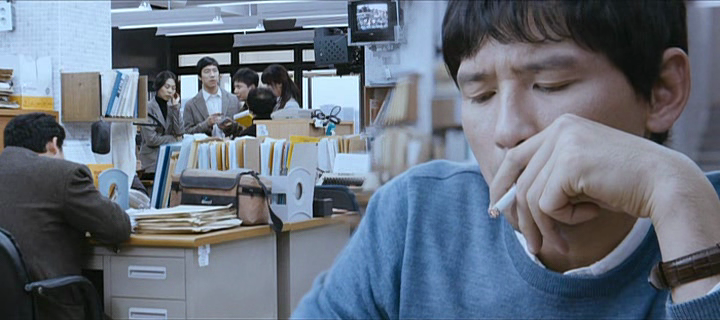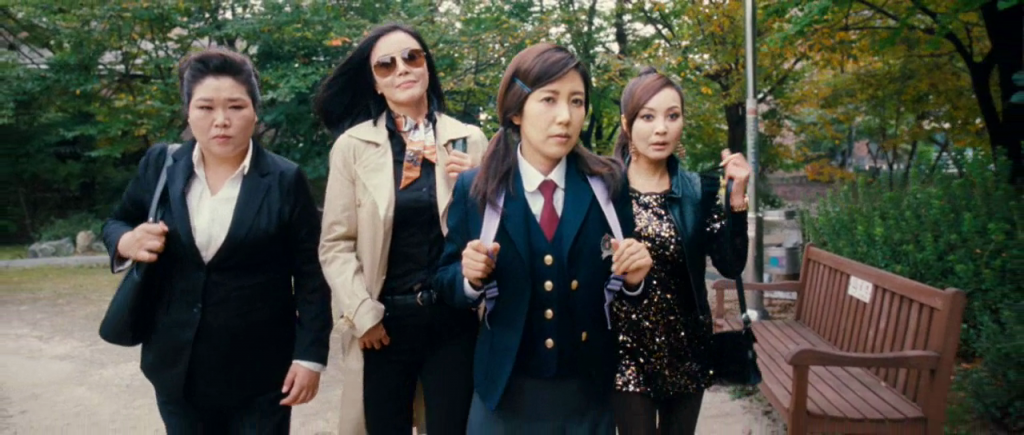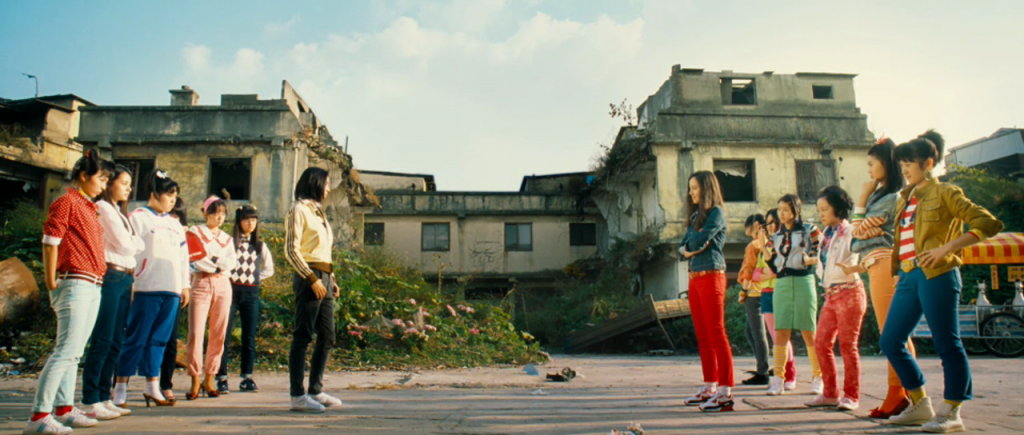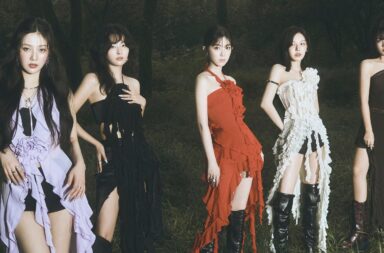2011 was an interesting year for Korean film. Once again, the top grossing film was a bit of an overhyped testosterone fest but there were plenty of great films to fill out the top ten, some great indie flicks and films that were much, much worse. These are my picks for the Good, the Bad and the “Meh” (shrug not optional) of 2011.
The Bad
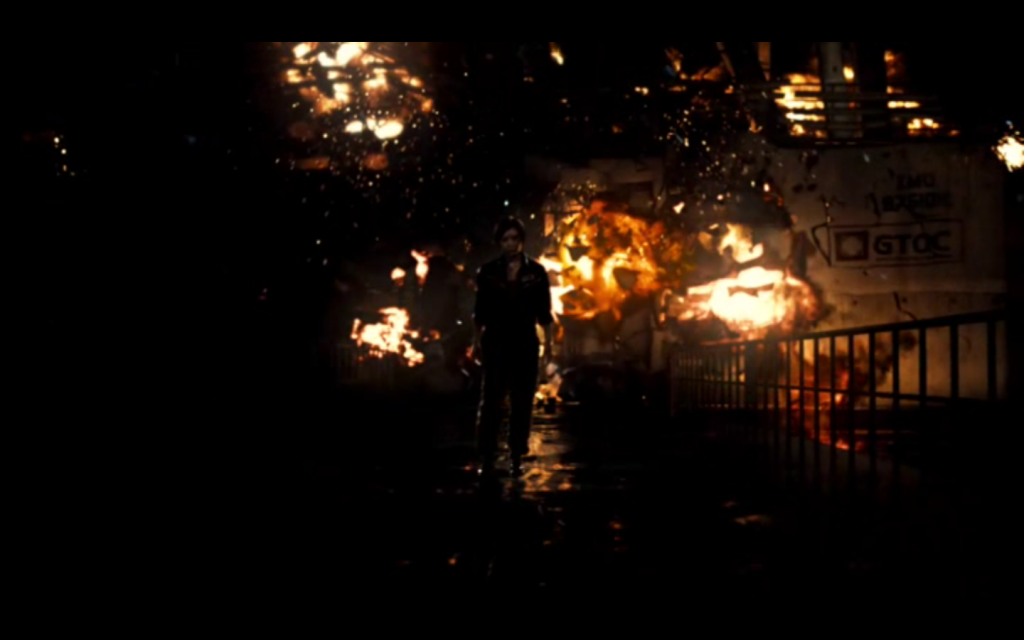 Sector 7
Sector 7
It’s always good to start these things with the bad. And this movie is so bad that it almost quite literally blew my mind. Sector 7 begins with Hae-Jun (Ha Ji Won), a worker on an oilrig, trying—and failing—to find oil way out in the ocean. Eventually after hundreds of attempts she and her team are asked to pack it up and move along. But she can’t and convinces the team to drill just one more hole. And voila! Oil! However there is also the small issue of sea monsters to contend with. What follows is a smörgåsbord of useless crane shots, poorly delivered exposition, derivative humor and awful character design. Unfortunately, a good cast—led by Ha Ji Won and Oh Ji Ho—can’t save this monster flick. Not only does it borrow shamelessly and poorly from The Host but seems to think it is in some sort of video game which is evidenced by the nauseating amount of CG landscapes and CG explosions.
Though the special effects took away from the realism, the world was fantastically realized. However, the abuse of CGI lessened the feeling of danger. Who cares if they get hurt if where they are isn’t real? And who cares about “real” people in a fake environment when they are poorly written and one-dimensional? The filmmakers could learn something from Sin City, The Host and Final Fantasy VII and X. The direction was tacky and over the top, and the scenes devoid of any action felt like cut scenes. The most significant thing I’ve taken away from this movie is that Ha Ji Won has no plans on growing her hair out. A boring thought, yes; but better than this film.
The “Meh”
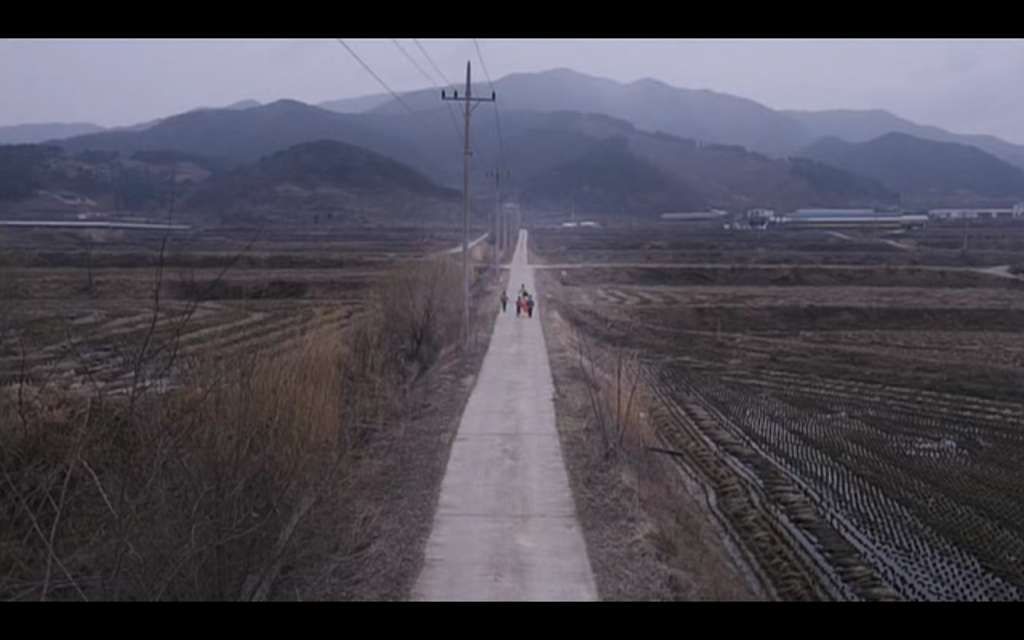
Children
I went into the film Children knowing that I was going to cry at some point. It’s a film about (or claims to be about) the real case of the missing Frog Children. In 1991, five young boys went into To-Am Mountain, as they often did, to look for frogs. They never returned home leaving everyone to wonder: what happened to the Frog Children?
And this is the only thing that managed to keep me watching until the end of the film. This film’s main strength is that it is based on a true story and attempts to make sense of what happened. I want to know what happened, everyone does and this is a movie that, one hopes, will shine light on the incident. However, the main character is weak, the film is so confused about what it is really about, and even the great performances can not save the undisciplined script.
The beginning of the film has great pacing and imagery but then begins a succession of ill placed arcs. There is the reporter who was busted for manipulating the reality of a documentary to get more ratings, there are the families of the lost boys—and in particular that of Jong-ho, there is the story of the doctor who thinks that the parents were involved in the disappearance and then at the end, another character suddenly gets his own little climax. In attempting to follow these stories the film ends up with a confused—not confusing—narrative with no constant string. There seems to be nothing motivating the film’s protagonist besides the audience’s desire to learn the truth.
And this is the most problematic thing about Children. The film takes advantage of the fact that we as an audience need to know what happened to those poor boys on March 26th, 1991. We want to find out who did it, we want to cry with the parents, we want to confront the bastard responsible, we want, we want, we want… However, the filmmaker’s job is to make the best film possible with a clear and driven plot. In trying to service these wants he was unable to do that. He was unable to show us more than just our wants and, further, why we want it in the first place.
In 2002, the remains of the boys were found in a section of the mountain that was thoroughly searched—or so it was thought—by the police. No one really knows what happened, only that the children had been murdered. Children could have been a great investigative thriller, but it turned into a hodge-podge melodrama, family drama, crime thriller, revenge story. Its only real redeeming qualities were fantastic performances from the women in the film and our—the audiences—burning desire to solve the mystery or for someone to get close.
Moby Dick
I wasn’t sure where to put Moby Dick in the beginning. The first half of the film is definitely “Meh”, the second half is “Good”. And all together it is the weak beginning to what I hope is going to be a very interesting series of films.
But as I must judge the film as a whole I can’t commit it to the best of 2011. Set in the early 90s, Moby Dick is about three journalists and a deserter trying to figure out the mystery of a bombing at Balam bridge. Hwang Jung Min plays Bang Woo, a jaded reporter. When his maknae, Yoon Hyuk (Jin Goo), appears and hands over documents and floppy disks full of, what he believes to be, government conspiracies and secrets, an investigation into the Balam Bridge bombing commences. Bang Woo is joined by Jin Gi (Kim Sang Ho) and Hyo Kwan (Kim Min Hee) and they attempt to discover who did it and why.
But things are, of course, not what they seem. Government intrigue, secret societies and political maneuverings are all waiting to be uncovered by the quartet. The film begins with a great opening, CCTV footage of the bridge exploding, but then pitters off with an odd pace in want of urgency. The editing is subpar, the direction has its moments of interest but it seems wasted on a lack of purpose and the director seems intent on holding the audiences hand through it all.
The themes of the film are what carry it, especially in the first half. It is the journalist versus the government. Journalists keep the government in check when checks and balances fail. Journalists should, like the government, serve the people. But all too often it is like a battle between the devil and god’s angels fighting far above all of us. Like the pigs in Animal Farm assuring us that we are all equal but some are more equal than others.
It is not until over an hour into the film that the pace picks up and the reporters start understanding the sense of danger they appear to be in. This is in part because, for the first half of the film, the “bad guys” seem completely impotent and the stakes for our characters are unclear. However, the last moments of the film blossom and the cliffhanger leaves an opening for a continuation of the investigation. Though Moby Dick wasn’t as great as it could have been, I’m interested in seeing what happens next.
The Good!
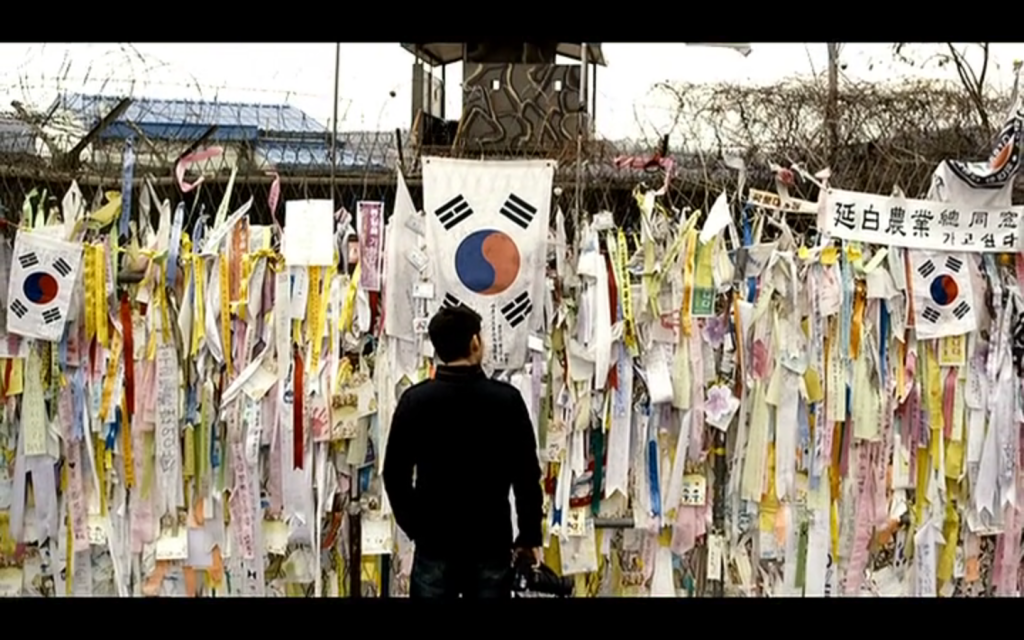 Phungsan Dog
Phungsan Dog
Yoon Kye Sang has no lines in Juhn Jai Hong’s Phunsang Dog. This is unsurprising as the film was written and produced by Kim Ki Duk. In Kim’s Bin Jib—starring Jae Hee—there were very few lines for the leading male. Jae Hee was excellent in Bin Jib. Yoon Kye Sang is marvelous in Phungsan Dog. Beautifully shot at night and competently during the day (on the Red!), the film follows Yoon Kye Sang’s character as he goes back and forth across the DMZ to send messages to people’s loved ones—and occasionally, transporting people as well.
Despite Yoon Kye Sang not having one line, it is completely clear what he wants, because he acts. Unlike in Children or, even, Moby Dick, he is a completely and perfectly active main character. The script by Kim Ki Duk shows and does not tell. Jeon, shows and does not tell. Yoon Kye Sang’s character is fully realized and three-dimensional and what he does is what maybe you or I would do if we were braver. He serves the people who really matter in the middle of the political debacle between North and South Korea. We see, eloquently told, the real tragedy of the two Koreas. It’s not about politics, and US capitalism, and communism versus South Korean democracy. It’s about the 84 year old woman who has been estranged from her husband for 60 years, the father who never saw his child graduate, the son who doesn’t know if his mother is alive or dead. Of course, there is also a love story. Not as eloquently or heartbreaking as that in Bin Jib but good in its own right.
There were some darkly farcical elements in the ending. The director has a bit fun with metaphor. This changed the tone of the film and felt, though integral to the theme, a bit distant from the character’s arc. And the ending. Unsatisfying, in a word. But overall, Phungsan Dog is a great film about those on either side, on both sides, or, like our main character, on neither, loyal only to what is right.
Sunny
I love this movie. Sunny was a great film. Not only did it deal with important themes for anyone in any walk of life, it was a fun, funny and touching ride. But I have to admit, they lost me a bit with the glue sniffing villain (mostly just the fact that she sniffed glue), but I’ll get to that.
Na Mi (Yoo Ho Jung), an underappreciated stay-at-home mom, is visiting her mother at the hospitable when she stumbles upon her old friend Chun Hwa (Jin Hee Kyeong). They haven’t seen each other since high school when they were in a (mostly) harmless little clique of girls named “Sunny.” Chun Hwa is terminally ill and this chance reunion compels Na Mi to find the other five girls that were in “Sunny”.
We watch these women bring together the “Sunny” they were in the 80s. It is an attempt to reclaim that special time of youth, that fleeting feeling of anything being possible. But as they get together they see where each of the girls has ended up, the women they’ve become. And it is tragic, because there was so much that they wanted and hoped for, and most got none of it.
This is Kang Hyung Chul’s second film, his first being the smash hit Speedy Scandal of 2008. Here, he uses the same skill and humor to tell a poignant story. The script, which Kang also wrote, goes back and forth between the past and present. The transitions are mostly seamless. They flashback to mid 1980’s Seoul, when the student protests were in full swing, the government on the brink and every girl in high school wanted something made by Nike. The composition and color of these scenes add to the nostalgia that is already there, what with the high school insecurity, boy troubles and bullies. Kang also assembled a brilliant cast. Jin Hee Kyeong, Yoo Ho Jung, Go So Hee, Kang So Ra and Sim Eun Kyung are the stars of this ensemble.
The film is not perfect. Certain parts are a bit on the nose, a little too neat and then there’s the glue sniffer… But over all, and most importantly, the strengths of the film (direction, script, cast, composition…everything else) outweigh the few missteps. It is a quite lovely piece of cinema that will leave all of us, whether in high school or out, cherishing those moments and looking to the rest of our lives with more optimism.
Also Catch:
The Crucible (One of the first films to really look at the dirty underbelly of Korean culture. It has sparked outrage due to the true story this film is based on: the physical, verbal and sexual abuse of the pupils at a school for the handicapped. Gong Yoo gives a brilliant performance, which excuses his unfortunate haircut.)
Quick (A fun ride. Explosions, comedy and Lee Min Ki. All fluff, no substance. There’s a reason this is under The Crucible in this list!)
Bedevilled (This was a 2010 release but its US premiere was in 2011 at the New York Asian Film Festival (where I first watched it) so I’m fudging the rules a bit! An abused woman on a claustrophobic island is on the edge. Her childhood friend may make the problem worse. A great watch, entertaining, frightening and heartbreaking.)
What are your picks for the good, the bad and the “meh”?
